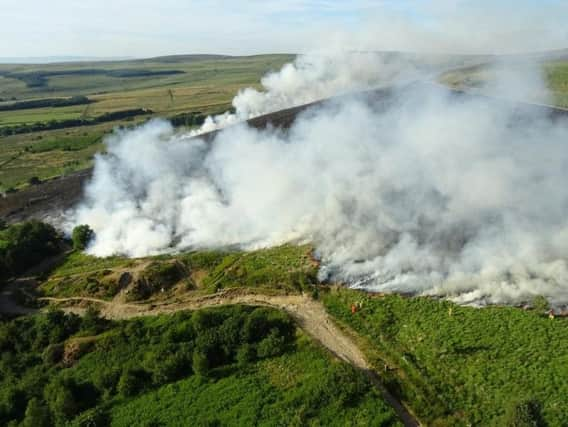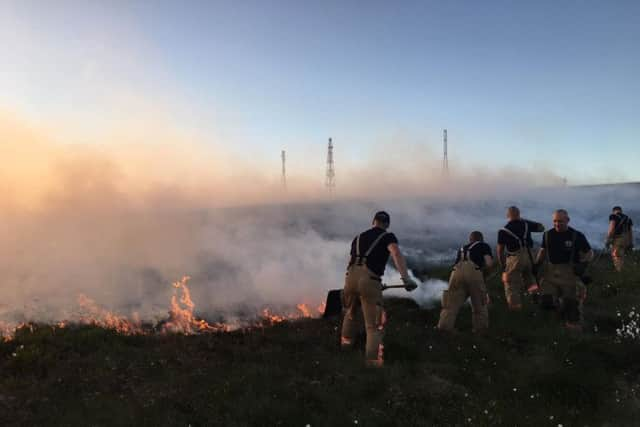'There must be no repeat of Rivington Moor fire'


Moorland fires blazed across Winter Hill near Chorley and Rivington, the peat underneath the ground smouldering away in the face of one of hottest summers on record.
But could a change in moorland maintenance by owners United Utilities help going forward?
Advertisement
Hide AdAdvertisement
Hide AdThat’s the question from some calling on action to prevent a repeat of the blaze which cost millions in manpower and equipment to tackle while local businesses lost revenue and residents faced insecurity.


Politicians, businesses and churches have come together to form the Winter Hill Fire Community Recovery Group, tabling a series of ideas to limit the impact of a future moor fire – as well as identifying shortcomings with the moorland management.
Kim Snape, Lancashire County Councillor for Chorley Rural East, said concerns have been raised about an apparent lack of maintenance of the moors.
Coun Snape, Labour’s prospective parliamentary candidate for South Ribble, said: “People were despondent about the lack of engagement after the fire by United Utilities.
Advertisement
Hide AdAdvertisement
Hide Ad“A lot of the people at the community meeting were saying United Utilities had not been maintaining the land over the years. That’s what a lot of the farmers were worried about as well.”
She added: “It’s a worry for people and businesses. A lot of people lost a lot of money. United Utilities have a big responsibility to play a part in this going forward. People want a plan of action.”
Similar concerns from farmers were noted at Heapey Parish Council’s monthly meeting in September, with the council’s chairman Coun Colin Grunstein attending the community group meeting.
Representatives of Chorley Community Housing, St Paul’s Church in Adlington and Lancashire County Council were also in attendance.
Advertisement
Hide AdAdvertisement
Hide AdAt the sub group’s inaugural meeting in August, Mary Horrocks from the Rivington Unitarian Chapel revealed how its tea room in Sheep House Lane had to close during the fire because of a loss of footfall from a lack of walkers.
“We had to close because of the smoke because we did not get the walkers through,” she explained.
“We lost money but we’re still looking into the details of it before we decide what’s next.”
The minutes from the meeting revealed how the Ironman UK race around Winter Hill usually benefits the chapel and team room with good visitor numbers “but these were down this year due to the thick smoke and road closures and lack of access to the venues”.
Advertisement
Hide AdAdvertisement
Hide AdMalcolm Allen, owner of record shop Malcolm’s Musicland and former councillor on Heapey Parish Council, did not attend but has backed extra protection to avoid another catastrophic blaze, saying: “I think [the moors] need protecting and controlling through the likes of controlled burning.”
Among the preventive measures tabled by the group and its sub group is the aforementioned controlled burning. Minutes from the sub group meeting write about making enquiries for “preventive measures such as controlled burning on moorland and also around town hamlets and villages”.
At the peak of the Winter Hill fire, which took ablaze at a similar time to one in Saddleworth Moor, United Utilities was criticised on this matter by North West university professor Rob Marrs.
Speaking to the BBC, Prof Marrs, a professor of applied biology at Liverpool University, said: “United Utilities and the Royal Society for the Protection of Birds didn’t think a big fire like this would happen to them but I’ve been predicting this for 15 years.
Advertisement
Hide AdAdvertisement
Hide Ad“Leaving the land alone causes much more damage than controlled burning because there’s more heather to burn so it gets hotter and spreads to the peat, which in turn spreads the fire.
“It wasn’t a matter of if, but when, and that when is now.”
The practice of burning of moors is done throughout the country as it is accepted by many that the act helps to prevent the spread of wildfires.
The group’s sub group – of which United Utilities is meant to be a part of – is set to meet again tomorrow and has invited the utilities company to attend.
The company could not confirm to the Post whether it would be in attendance.
Advertisement
Hide AdAdvertisement
Hide AdUnited Utilities catchment manager Matthew Upton said: “We have not used controlled burning on our land for a number of years as part of a commitment to improve the quality of water on our catchment land, especially in areas of deep peat, such as on Winter Hill. This is also the current policy of the government’s adviser on environmental matters in England, Natural England.
“However, we do use other methods, such as cutting heather, rather than burning it, and this has proved to be very effective.
“It is not the reason this year’s fires happened.
“No one wants to see a recurrence of the exceptional and tragic events of earlier this year, so we are working hand in hand with other partners to look at how we can all manage the land in accordance with Natural England’s approved practices to reduce fire risk and help our damaged moorland and its unique wildlife recover and be more resilient for the future.”